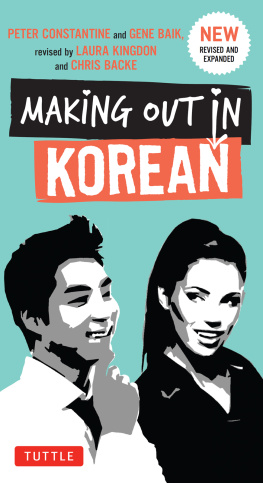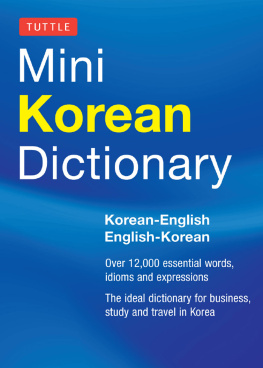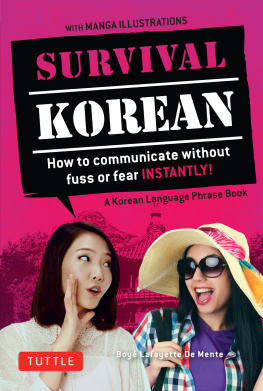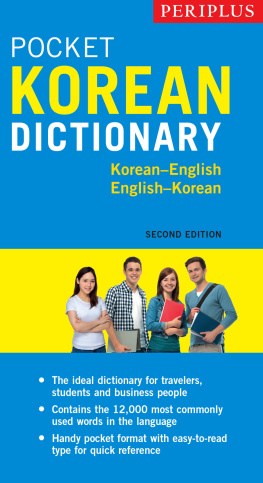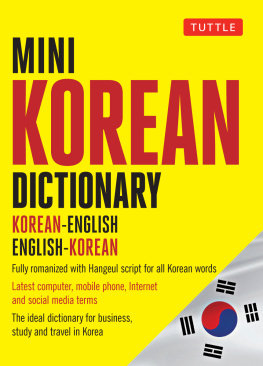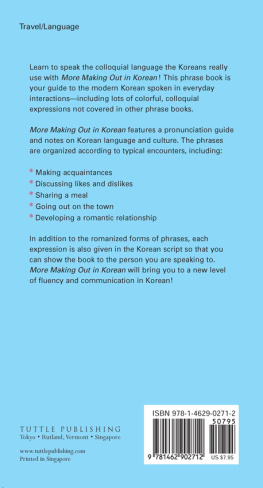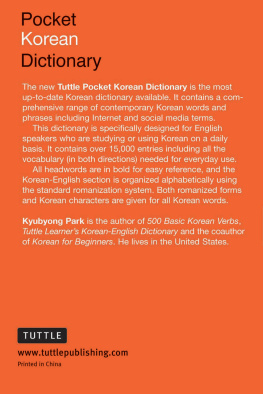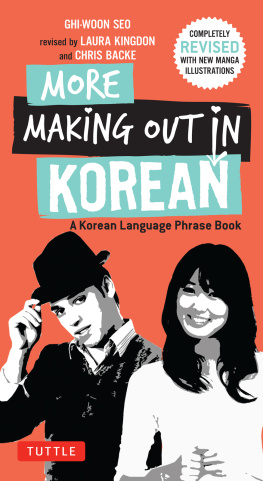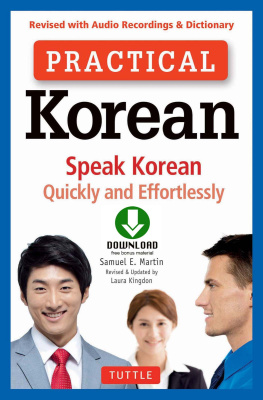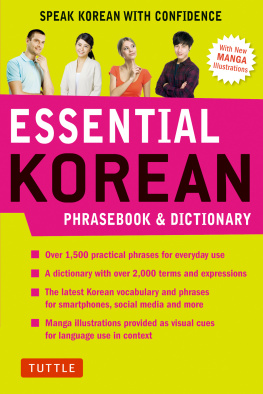
Whats Up? POLITE GREETINGS How are you? annyeonghaseyo? ahn-nyawng-hah-seyo? ? Im fine, thanks. And you? ne, annyeonghaseyo? ne, ahn-nyawng-hah-seyo? , ? Annyeonghaseyo? ? is a greeting that asks about the other persons well-being or good health. This expression can be used at any time of the day as Good morning, Good afternoon, Good evening, Hi, Hello, or Hows it going? The common response is simply ne, annyeonghaseyo? , ? . How do you do? cheo-eum boep-kketsseumnida. chuh-um bwep-kke-sseumnee-dah. .
Whats new? byeollil eop-jjiyo? byulleel up-jyo? ? Nothing much. geujeo geuraeyo. geu-juh geu-rayo. . Things are hard. chohm him-deul-uhyo. . .
Things are busy. jom bappayo. chohm bah-ppah-yo. . How have you been? yojeum eotteoke jinaeseyo? yo-johm uh-ttoh-kay jeenehsay-yo? ? Ive been fine, thanks. chahl jeenayo. . .
CASUAL GREETINGS BETWEEN CLOSE FRIENDS How are you doing? jal isseosseo? chahl iss-uss-oh? ? Yo, whats up? ya, jal isseonnya? yah, chahl iss-uht-nyah? , ? Dude, whats up? saekki, jal isseonnya?* sakkee, chahl iss-uht-nyah? , ? jasik, jal isseonnya?* jah-sheek, chahl iss-uht-nyah? , ? * Saekki baby animal and jasik human baby are used in Korean slang the way asshole is used in American English. When said to ones closest friends, they can be expressions of affectionbut handle with care. Howve you been? eotteoke jinaesseo? uh-toh-kay jiness-uh? ? Im fine. jal isseosseo. chahl jinessuh. .
Have you been doing OK? jal jinaesseo? chahl jinessuh? ? Yeah, man! geurae, i jasiga! geurae, i jashigah! , ! Handle with care. Where did you go? eodi gasseosseo? uh-dee gahssuss-uh? ? Its been a while. oraenmaniya. awren-mahnee-yah. . geurae, oraenmaniya. geu-rae, awren-mahnee-yah. , . , .
Hows Peter/Mary? Peter/Mary jal isseo? Peter/Mary chahl isso? / ? Yeah, Peter/Mary is fine. eung, (Peter/Mary) jal isseo. eung, (Peter/Mary) chahl isso. , (/) . The subject is often omitted when it is clearly understood from the context. ( eung ) is very often used in casual conversation to agree with something the other person has said.
Its said a lot like a grunt. How are Peter and Mary? Peter hago Mary jal isseo? Peter hahgo Mary chahl isso? ? Yeah, Peter and Mary are fine. eung, (Peter hago Mary) jal isseo. eung, (Peter hah-gaw Mary) chahl isso. ,( ) . eung, byeollil eopseo. eung, byullil upso. , . , .
Yeah, he/shes OK. eung, jal jinae. eung, chahl jee-nay. , . Yeah, he/shes doing so-so. eung, geu-juh geuray. , . , .
Whats wrong, man? wae geurae, imma? wa geu-ray, eem-mah. , ? Handle with care. Keep in mind as well that ( eem-mah ) is a swear word used by men and will sound very coarse and weird coming from a woman. Nothings wrong with me. amugeot-do aniya. . .
What are you doing here? eojjeon iliya? uh-chun illeeya? ? Nothing special. geunyang. geun-yahng. . Really? jeongmal? chawng-mahl? ? Are you serious? jinjja? jeen-jjah? ? Oh, yeah? geurae? geu-ray? ? Youre lying! geojitmal! guh-jeen-mahl! * ! *The t sound in geojitmal becomes an n here ( guh-jeen-mahl ) when said in normal speech. Are you lying? geojitmaliji? guh-jeen-mahlee-jee? ? Dont lie! geojitmal hajima! guh-jeen-mahl hahjeemah! ! Stop lying! geojitmal geuman hae! guh-jeen-mahl geumahn hay! ! ! What? mwo? mwo? ? Huh? eoh? aw? * ? *Said nasally, like the French en .
I dont believe it! mideul su ga eopseo! meed-eul soo gah upsaw! ! Why? wae? way? ? Why not? wae aniya? way ah-nee-yah? ? Youre joking! nongdamiji! nohng-dahmee-jee! ! Youre not joking? nongdam aniji? nohng-dahm ahnee-jee? ? Im not joking. nongdam aniya. nohng-dahm ahnee-yah. . He/Shes joking! nongdamiget-ji! nohng-dahm-eeget-jjee! ! Are you making fun of me? nollinya? nohllee-nyah? ? I guess so. geu-roh-get-jjee. . Maybe. geureol keoya. geurull ggoyah. . Maybe not. anil keoya. ah-neel kker-yah. . .
Thats impossible! maldo an dwae! mahl-doe ahn dway * ! ! * Dway or daythe w is almost not pronounced at all You cant do that. geureoken motae. geu-roh-ken moat hay. . I dont care. sahng-gwahn upso. . .
Its got nothing to do with me. narang sang-gwan eopseo. nah-rahng sahng-gwahn upso. . Im not interested. gwahn-seem upso. . .
I think thats it. geugeoya. geu-goyah. . I think this is it. ee-goyah. . .
Youre crazy! neo micheo-sseo! naw mee-chuss-o! ! Damn! jegiral! je-gee-rahl! ! Thats right. maja. mahj-ah. . Is this it? igeoya? ee-goyah? ? This is it. ee-goyah. . Sure. geureom. geu-rum. . Its true. jinjjaya. jeen-jjah-yah. . .
I understand. alasseo. ahlahsso. . No problem. moonje upso. . .
I like it! joa! joe-ah! ! Me, too. nado. nahdoh. . OK! joa! joe-ah! ! alasseo!* ahlahsso! ! *Literally means I know. Hey! ya! yah! ! Handle with care.
Great! joa! joe-ah! ! Literally means I like it. I hope so. geureogil barae. geuroh-kil bah-ray. . wieomhae. wee-um hay. . Cheer up. him nae. heem nay. . Smile. useo bwa. ooh-suh ba. . 
Basic Phrases Yes. ne. (polite) nay. . eung. (intimate) eung. . No. anio. (polite) ahnee-oh. . ani. (intimate) ahnee. . Right. maja. mahjah. . .
What? mwo? mwo? ? Who? nugu? noogoo? ? Where? eodi? uh-dee? ? When? eonje? on-jay? ? Why? wae? way? ? How? eotteoke? uh-tto-kay? ? Which? eotteon geo? uh-ttun go? ? Whose? nugu kkeo? noogoo kko? ? This. igeo. eego. . That. (something over there) juh-go. . geugeo. (something close to the listener) geugoh. . Here. yeogi. yohgee. . There. jeogi. (over there) johgee. . geogi. (close to the listener) gohgee. . Maybe. geureol keoya. geurull kkoya. . Maybe not. anil keoya. ahneel kkoya. . .
I na nah You neo naw He/She jyae (used in a persons presence, informal) jay gyae (used in a persons absence, informal) gyay We uri ooree You (plural) nedeul nee-deul They jyaenedeul (informal) jyehne-deul Dont! haji ma! hahjee mah! ! Please. jebal. jebahl. . Thank you. gahmsahm-needah. . gomawo (intimate). gohmahwah. . .
Can I have this? igeo gajeodo dwae? (informal) eego gahjuh doe dway? ? How much is this? igeo eolmayeyo? (polite) eego olmah-yay-yo? ? Thats not cheap. ssan ge anieyo. (polite) ssahn gay ahneeeyo. . Thats too expensive! neomu bissayo! (polite) nuhmoo bee-sahyo! ! Im not buying this. (polite) eego ahn sahl kkoyay-yo. . .
Make it cheaper and Ill buy it. jom deo ssa-myeon salkkeyo. (polite) chohm duh ssahm-yuhn sahlkkay-yo. . Haggling over prices happens mostly when youre buying something second-hand. There are still lots of open-air markets around, and a few of them are geared specifically toward tourists.
Theres still some room for haggling in places like this. But more and more shopping these days is done in large department stores, where the prices are fixed and markedno haggling here. For a shopping experience that combines traditional with modern, visit Namdaemun and Dongdaemun, two massive markets in Seoul. Dongdaemun is particularly famous for up-tothe-minute fashion, accessories and fabrics. Namdaemun is hundreds of years old, and boasts a lot of hard-to-find items. Both are great for a dose of Korean goods, food and people.
What are you looking for? mwo chaj-eu-se-yo? mwo chah-jeu-say-yo? ? Im just looking. Geu-nyang bo-neun geo-ye-yo. Geun-yang boh-neun goyay-yo. . Dont worry. kuck-juhng mah-say-yo. . .
Here! (to call a salesperson) yeo-gi-yo! yo-gee-yo! ! Do you have a bigger size? han chi-su keun geo iss-eo-yo? hahn chi-soo keun gaw issoyo? ? Do you have a smaller size? han chi-su jak-eun geo iss-eo-yo? hahn chi-soo chahgeun gaw issoyo? ? Body language is common in Korea, just like in the West. This language has plenty of gestures of its own (and there are lots of websites that will show them to you, like Eat Your Kimchi (www.eatyourkimchi.com) and many others). Most Western gestures are OK (and if theyre considered rude in the West, you might want to think twice about using them elsewhere). Here are just a few useful tips. Give and receive with with both hands. When beckoning to an adult or hailing a cab, turn your palm downward (so different from the West) and wave your fingers toward you.
Next page
